November is the Month of the Holy Souls in Purgatory. If you aren’t in the habit of hanging out in cemeteries and praying for the dead with your kids . . . well, you’re really missing out. And so are your kids. AND so are the dead.
As Christians, we believe that the dead are not gone. Their bodies have died, but their souls live on forever.
We believe that Jesus will come at the end of time to judge all human beings who have ever lived. This is called the general judgement. But those who die before Jesus comes again, face what is called the particular judgement.
“There are three possible outcomes to the particular judgment. Those whose love for God
has been perfected in this life are taken straight to heaven, where they enjoy endless
happiness in the face to face vision of God. Those who die in God’s love but still love
Him imperfectly must be purified in the intermediate state of purgatory. Those, however,
who reject God’s love by mortal sin and die without repenting are condemned to the
everlasting torments of hell. The general judgment at the end of time simply solemnly
confirms the particular judgments of each one, with the difference that then the body as
well as the soul will receive what is due it. And all God’s judgments will be revealed as
most just.” -Rev. William G. Most
As
Catholics we believe that our deceased loved ones who died in God’s love are a very real part
of the Church. We the believers are divided into three parts . . .
1.
The Church Militant: That’s us. “Militant” because we are fighting . . .
against our inclination towards sin, against our fallen natures, against
temptation, against the devil.
2. The Church Triumphant: That’s the
saints. Everyone who has died and gone to heaven is a saint. Some saints
lived lives of such heroic virtue that the Catholic Church recognizes
them by name, and holds them up as models for us to emulate.
3. The Church Suffering: That’s who we are praying for this month, the holy souls in purgatory.
“Those in purgatory cannot pray for themselves, this is why they are
called “poor” souls. They can no longer merit anything for themselves
and rely entirely on others to pray and make sacrifices on their behalf.
As they are nevertheless part of the communion of saints, they depend
upon us to help ease their suffering and quickly advance them through
their purification so that they can join the saints in heaven.
Prayers for the faithful departed please God, who makes use of our
prayers to help purify these souls that He loves. It is an act of
charity that we can give for those we have known and loved, for our
ancestors who gave us life, for those souls whose memory is lost, and
for those who have no one else to pray for them.” –Gretchen Filz
Death, and dying, and the dead are all
things we mostly try to keep far, far away from our children. I did,
anyway. But I don’t anymore. And praying for the dead, especially in
November, ESPECIALLY especially this week, has become a really beautiful
family tradition for us.
In case you aren’t in the habit of hanging out in cemeteries with your kids, I figured I’d share the whens and whys and hows.
WHEN
Now. Like RIGHT now.
The whole month of November is dedicated to the Holy Souls in Purgatory. This week, from All Saints Day on November 1st through November 8th, there is a special indulgence available.
A partial indulgence can be obtained by devoutly
visiting a cemetery and praying for the departed, even if the prayer
is only mental. One can gain a plenary indulgence visiting a cemetery
each day between November 1 and November 8. These indulgences are
applicable only to the Souls in Purgatory.
WHY
One of the Spiritual Acts of Mercy is to Pray for the Living and the Dead. It truly is a beautiful act of charity to pray for these souls who cannot pray for themselves, and to make sacrifices for them since they cannot make sacrifices for themselves.
Frankly, I wasn’t sure how my kids would take it. But we’ve been doing special prayers for the dead every November for the past few years, and my kids love it.
The Catechism of the Catholic Church defines purgatory as a
“purification, so as to achieve the holiness necessary to enter the joy
of heaven,” which is experienced by those “who die in God’s grace and
friendship, but still imperfectly purified” (CCC 1030). It notes that
“this final purification of the elect . . . is entirely different from
the punishment of the damned” (CCC 1031).
The purification is necessary because, as Scripture teaches, nothing
unclean will enter the presence of God in heaven (Rev. 21:27) and, while
we may die with our mortal sins forgiven, there can still be many
impurities in us, specifically venial sins and the temporal punishment
due to sins already forgiven.
They really get that these are people who need their help. It’s
something important and meaningful and useful that kids can do
just as well as grownups. Maybe better. At least with more enthusiasm.
HOW
1. On All Souls Day itself, if you visit a church, and pray the Our Father and the Creed, you can be granted a plenary indulgence applicable to the souls in purgatory.
A plenary indulgence can be gained only once a day.
In order to obtain it, the faithful must, in addition to being in the
state of grace (as opposed to being in mortal sin):
—have the interior disposition of complete detachment
from sin, even venial sin (which isn’t the same thing as never sinning);—have sacramentally confessed their sins within a few weeks;
—receive the Holy Eucharist within a few days (it is certainly better to
receive it while participating in Holy Mass, but for the indulgence only
Holy Communion is required);—pray for the intentions of the Supreme Pontiff.
2. Any time between November 1st and 8th, you can visit a cemetery and pray for the dead. Any time of the year, you can obtain a partial indulgence for praying for the dead in a cemetery, but this week you can obtain a plenary (or full) indulgence. You can obtain one on each of those days. This year, on All Souls Day, we met two other families at a cemetery and the kids all (devoutly) ran around the cemetery praying for the dead by name and leaving a flower at the gravestone. It was beautiful and sweet and moving and fun.
We can always pray for specific souls like this, or for our own loved ones, by name. If that soul doesn’t need our prayers, God will pass them along to another soul in need.
3. A partial indulgence, applicable only to the souls
in purgatory, can be obtained when the Eternal Rest (Requiem
aeternam) is prayed. This is a good prayer to recite any time, but it’s especially appropriate
during the month of November:
Eternal rest grant to them, O Lord, and
let perpetual light shine upon them. May the souls of the faithful
departed, through the mercy of God, rest in peace. Amen.
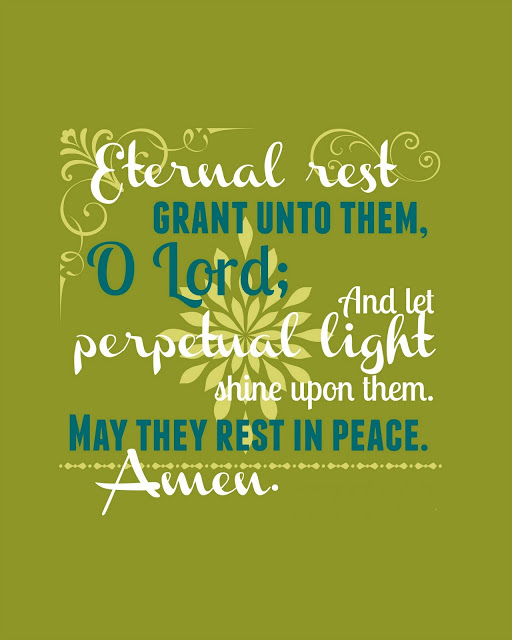 |
| by request, here it is in the shop! |
4. Soul Cakes! I like the idea of having special foods we make that are associated with the liturgical year. During Lent, we make soft pretzels, during Christmas, we bake special cookies, for the Holy Souls in Purgatory, we make soul cakes.
I use this recipe from Lavender and Lovage, but it’s in British. Here’s a translation of measurements:
- 1.5 sticks butter
- 3/4 cups granulated sugar
- 3 egg yolks
- 3 1/3 cups all purpose flour
- 2 tsp mixed spice (I used cinnamon, nutmeg, and cloves)
- 2/3 cup raisins
- A little milk (I use buttermilk if I have it on hand)
Praying for the dead with kids: it’s not spooky, it’s not scary. It’s sweet and empowering and awesome.
If you’d like to keep track of ALL the feasts of the Catholic liturgical year, I’ve created a wall calendar to help you do it!
It features the all the feasts and fasts of the Universal Calendar and then some, illustrated with images featuring the traditional Catholic monthly devotions. It’s an easy visual way to bring liturgical living into your home. You can keep track of the feasts and fasts and seasons of the Catholic year, and be reminded to focus your prayer on a different aspect of our faith each month.
As the Church year begins with December, so does this calendar. You get December 2018 through December 2019, thirteen months. Available for purchase here. Thanks!
Coupon codes are available from the publisher here.
Related reading . . .
From this blog:
At the End, Charlotte Dies: a Reflection on Death for All Souls Day
Little Kids and Death: How Taking My Kids to a Traditional Funeral Didn’t Freak Them Out
From around the interwebs:

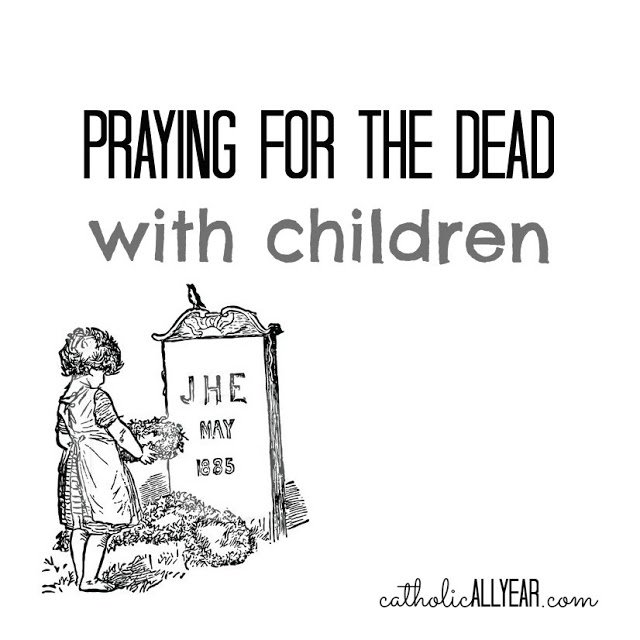
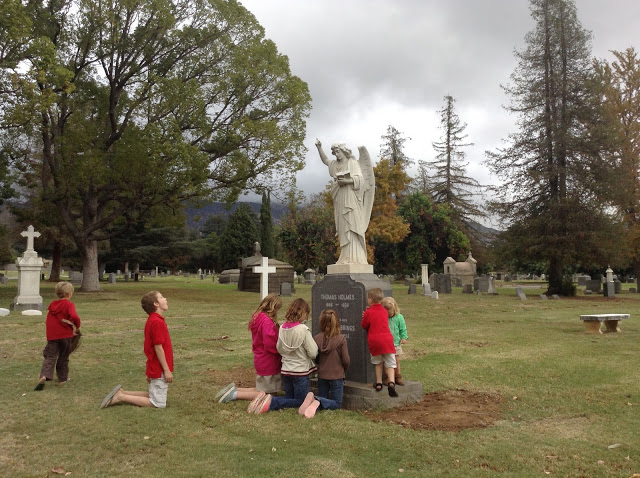
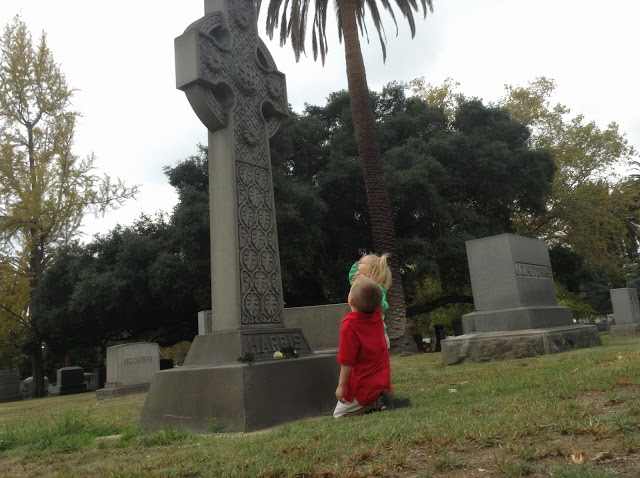
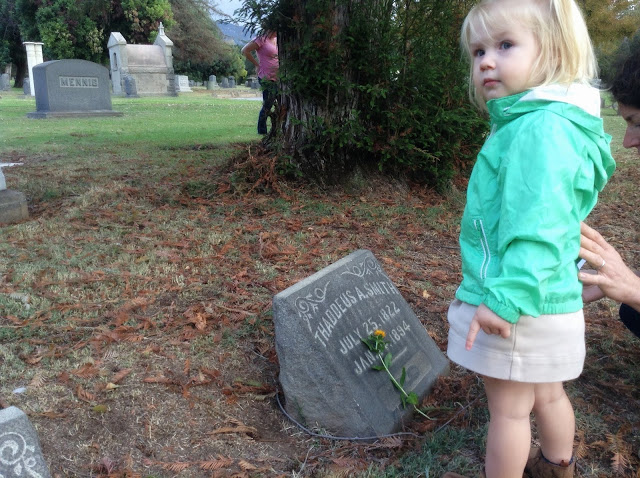
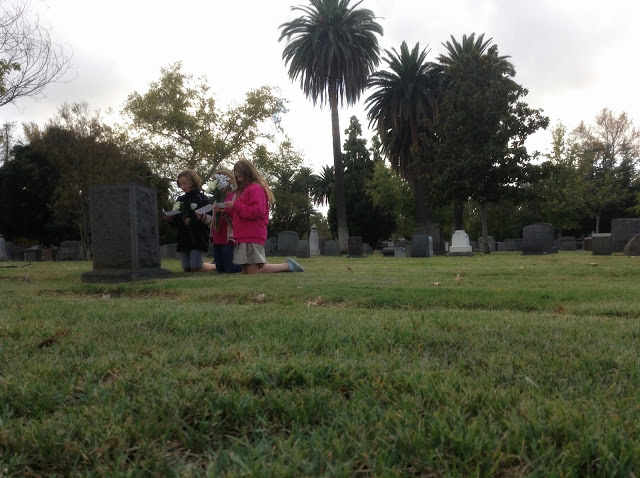
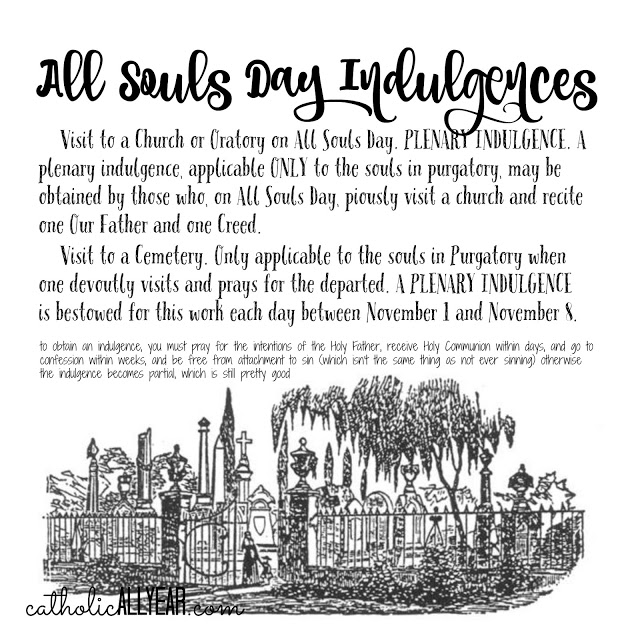
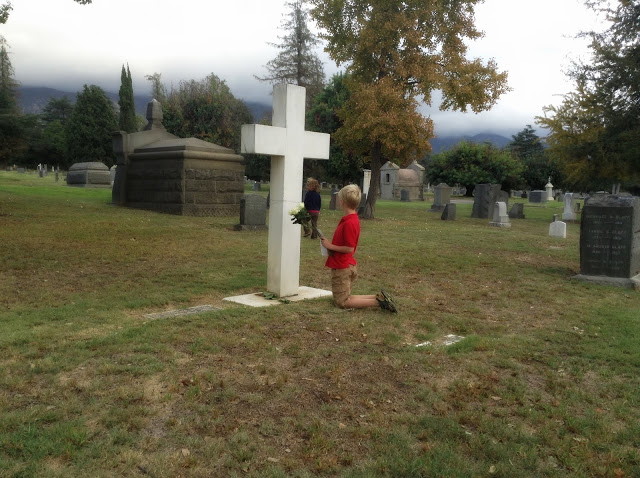
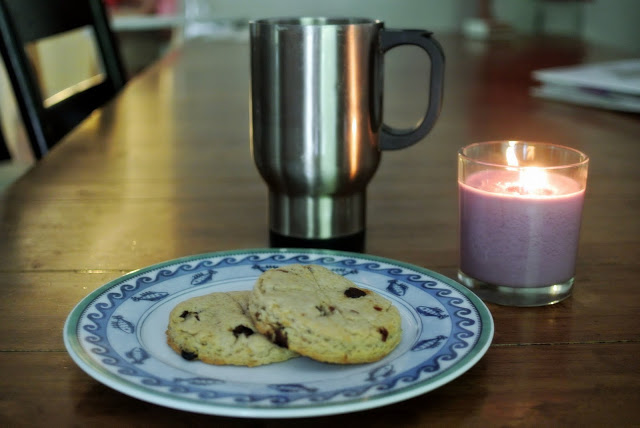
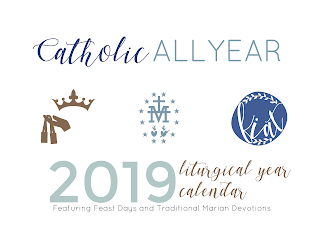
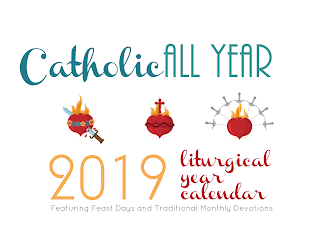


We visit relatives graves for All Souls, and it is a beautiful tradition. (My relatives and husbamd aren't religious but appreciate This too.) We brought flowers and my three year old ran around picking up flower pots that fell over. And it's a great reminder of mortality, in a good way, to focus on glorifying God in the small time we have.
We had a feast of German food on All Souls' day, since the majority of our ancestors are of German ancestry. The kids were not impressed with sauerbraten. I also found a super easy project on pinterest — find a glass votive candle and, with a sharpie, write the names of the deceased on it and decorate with religious stickers. We light it every night after dinner and pray the Eternal rest prayer.
I love that idea. Candles are so enthralling to my kids.
Karyn, I was trying to think of a way to recognize/pray for our deceased relatives that would make an impression on our toddlers. The candles are a great idea. They love candles. Thanks for sharing!
We could not make it to a cemetery on All Souls' Day so we gathered up a bunch of calendars (as many as we could find) and sat in the dark living room after sundown. We each named a deceased loved one and lit one candle, going around and around until we were out of candles (we had a few for "everyone who has died"). The kids LOVED IT because it was dark with just candlelight, and also because we NEVER get to light that many candles all at once. Once they were all lit we prayed the Eternal Rest prayer. It was awesome.
Um, we gathered CANDLES, not calendars. Although I'm sure lighting a bunch of calendars on fire in our living room would be exciting too.
Are you planning to make that printable prayer available in your Etsy shop??
Thanks Charla! I just added it and put the link under the image.
Frequent reader of your blog as a SAHM to 2 boys, trying to integrate the faith into our daily lives. We did soul cakes for the first time this year and they were a big hit. I'm still not sure how to discuss death and purgatory with a 4yo. We've discussed how awesome Heaven will be and he's been to a cemetery and prayed for those who have died, but the alternatives intimidate me. The way you've written it out gives me some inspiration!
Thanks Alison!
We started talking about purgatory and death etc with our little kids when a relative passed away. It was right around thr beginning of Lent years back. I realized that since we take our kids to mass and stations of the cross, they really already knew that people, and Jesus, died/die. They weren't upset add we talked about how there's the possibility of life forever in Heaven and that before Heaven there's an extra way to get "scrubbed" if we're not quite bright enough in our souls ( purgatory). If you talk about all this stuff in light of how good God is and how we're always safe if we stay very close to him, death isn't so scarey. Good luck! Also, thank you too Kendra for another great post, both topic and tone.
I really love your posts on lesser known Catholic things like indulgences. I never learned about or understood them growing up and your posts are *super* helpful. So thanks! Most of my family's dear departed were cremated but I go to the cemetery where my grandfather is buried and pray for all of them. And I had to laugh at your translation of the recipe because "it's in British." 🙂
I have found that I REALLY look forward to this prayer time in the cemetery. Last night, we drove around in the dark, praying our Rosary, and it was such a peaceful way to end the day with my husband and kids. It really put the day in perspective and soberly reminded me not only of the four last things: death, judgement, heaven, and hell, but also that the main purpose of my vocation is to get my husband and children to Heaven. As we drove by one of the exit gates last night, even my son (3) said hopefully, "We're not going home yet? I want to stay here and keep driving around."
Hi Kendra!
I have a very honest question (as Protestant who isn't as familiar with these practices) that I sincerely hope does not come across rudely: Where is the Biblical foundation for the existence of Purgatory?
Love your blog! Your kids, your faith, and your lifestyle are all so inspiring!
~Stephanie
Thanks Stephanie!
In Matthew, Christ tells the Pharisees that anyone who speaks against the Holy Spirit will not be forgiven either in this world OR IN THE NEXT (Mt. 12:32). So that means there are some sins that CAN be forgiven in the next world. Also, in the first letter to the Corinthians, St. Paul says that "the fire will assay the quality of everyone's work," and "if his work bums he will lose his reward, but himself will be saved, yet so as through fire" (1 Cor 3:13, 15). Which again, implies some penal suffering, after death.
There is also a whole episode in Maccabees that ends, "Therefore he made atonement for the dead, so that they might be set free from their sin" (2 Mac 12:42-46). But that book of the Bible got booted when Martin Luther put together the, um, streamlined Protestant Bible. 😉 So most Protestants dismiss that.
The word Purgatory isn't in the Bible. But there is a Purgatory shaped hole, that needs filling by SOMETHING. Nothing imperfect can stand before God, but very few of us die completely in love with God, completely free from attachment to sin, from self-centeredness and selfishness. Catholics don't believe that an all benevolent God would condemn all those loving but imperfect folks (like you and me) to hell. But how can a perfectly just God just say, oh well, I didn't really mean all that stuff about being perfect, come on in.
The early Church Fathers, and all the believers of the early Church, for almost two thousand years, accepted the necessity of some interim state of purification, for those who WILL get to heaven, but need to be perfected first. It's only in the last 4-500 years that there's been any question about whether purgatory exists. I sure hope it does! I think I'll probably need it.
I love this reply, thanks for it – I think there is quite a lot about Catholicism that is misunderstood by Protestants and you have helped clarify many of those misunderstandings for non-Catholic readers (like me! 🙂 ) Related question for you: how do the sacraments, especially baptism, fit into the afterlife tiers? Is purgatory only available to those who have received baptism and other sacraments? Or can anyone living a relatively morally clean life be purified before the final judgment? Thanks!
Thanks Amy, and you're welcome.
The official Catholic answer is that we don't know for sure, but if a person didn't have the opportunity to be baptized, (ie, had never heard of Jesus, or was raised in an anti-Christian environment, or was a baby or child unable to request baptism for himself) a merciful God would not deny entrance to heaven to that person, and purgatory is the exact solution to that problem.
Whenever I think about this and related topics, I always come back to CS Lewis in my head. Everything he writes is SO RICH with symbolism. In The Dawn Treader, we get a beautiful description of purgatory when Eustace becomes a dragon as a result of his greed and obstinacy. Aslan saves him and heals him, but Eustace has to suffer. He must have the dragon hide scratched slowly and painfully off of him, but he emerges a different young man. His pain has purified him of his attachment to sin. Just like in purgatory.
And in The Last Battle, we have the example of the noble Calorman. He is a good man and a devoted follower of the terrible god Tash. But when he appears before Aslan after death, Aslan tells him whatever good he did in the name of Tash, was really done for Aslan.
Of course C.S. Lewis isn't a catechist or canon lawyer, he wasn't even (quite) Catholic, but what he writes really feels true to my experience of my Catholic faith.
Thanks for the reply. I love CS Lewis. Especially his Narnia books, I agree, such powerful, beautiful symbolism!
This was an interesting post with a lot of answers. I'm sure you will cringe when you read this, but I remember as a girl praying with my Grandfather and he gave me a card with a prayer and it said every time I said this prayer I would release a certain number of souls from purgatory. Well, at least that is how my 7 year old mind processed it…. I didn't think it was creepy and I prayed that prayer many times. Although it was not November 🙁 So I was probably doing it wrong, but I think God understood my intention.
The St. Gertrude prayer! That's actually the one we said as we went around the cemetery! The tradition (slash superstition) around that prayer is that 1000 souls would be released from purgatory every time it was said devoutly. It's a great prayer. Our Lord himself gave it to St. Gertrude, according to her writings.
But . . . there are some issues with the whole 1000 souls thing, especially since the Catechism tells us we cannot gain more than one indulgence per day.
Saint Gertrude’s writings contain nothing about a promise to release 1,000 souls from purgatory each time the prayer is said
There was an epidemic of prayer cards containing false promises and indulgences
The Church has summarily condemned prayer cards containing a promise to release one or more souls from purgatory
The supposed approval by M. Cardinal is dated that exact same day as the approval by Manuel Gonçalves Cerejeira of the book Read Me or Rue it, a book by Fr. O’Malley containing the prayer but not the promise
Such an easy way to release 1,000 souls seems inconsistent with the Church’s understanding of purgatory, given that ordinarily to release one soul requires a plenary indulgence which is very difficult to get, and given all the means the Church employs to help the dead such as special masses or indulgences applicable only to the dead
So . . . it's a good prayer. But it's not a magic prayer. 🙂
Thanks for the clarification . Also, we wore saints pinned to our under clothes that were to keep us from burning in hell. I'm from South Louisiana so there are many superstitions. My Grandmother was a traiteuse which is like a Catholic faith healer with a good dose of superstition; )
I feel like this is a stupid question, but does it matter what you pray at the cemetery? Like is there a certain prayer that should be said, or phrases? I'm new to all this and would hate to do it "wrong". I'm going to take my little tomorrow! -megan
There are no stupid questions! No, that's not true. There ARE. But this one isn't. 🙂
For the All Soul's Day visit to the church, there are specific prayers you are supposed to say: the Our Father and the Creed. But for the visit to the cemetery, there aren't any specific prayers, you can just say whatever you'd like, even if it's just in your head.
But the St. Gertrude Prayer:
Eternal Father, I offer Thee the Most Precious Blood of Thy Divine Son, Jesus, in union with the masses said throughout the world today, for all the holy souls in purgatory, for sinners everywhere, for sinners in the universal church, those in my own home and within my family. Amen.
Or the the Eternal Rest prayer:
Eternal rest grant to them, O Lord, and let perpetual light shine upon them. May the souls of the faithful departed, through the mercy of God, rest in peace. Amen.
would be especially appropriate. And you can never go wrong with the rosary!
This post as so inspiring! And your graphics/artwork are simply beautiful, Kendra. The "All Souls Day Indulgences" with the cemetery sketch is gorgeous. You have a knack for finding the exactly perfect piece of art to go with your topic.
I always feel like getting indulgences is so complicated! There's the act, and confession, and receiving the Eucharist, and the whole "complete detachment" from ANY SIN AT ALL. How on earth can I be certain I'm completely detached from sin? And what if I don't make it to confession this week because I just can't?
Also isn't there something about needing to pray for the intentions of the Holy Father, too, or is that only for certain specific indulgences?
Hi, Kendra. We've sent you an e-mail request. Can you please take a look? Thank you!